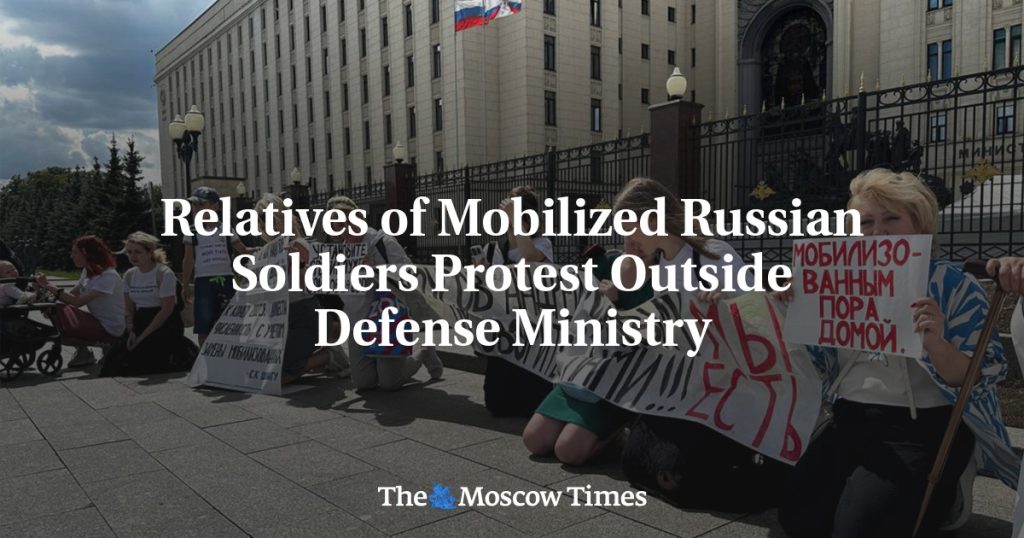A group of women staged a protest outside the Russian Defense Ministry building in Moscow, seeking the return of their loved ones who were drafted to fight in Ukraine. Around 15 women, some with young children, gathered, holding up placards and demanding a meeting with Defense Minister Andrei Belousov. The protest was in response to the branding of the organization Put Domoy as a “foreign agent,” a movement working to bring back men mobilized after a September 2022 draft. The women, who did not wish to disclose their identities, were relatives of men fighting in Ukraine and held the protest without inviting media attention due to previous arrests of journalists at Put Domoy protests.
The women, many with young children in tow, knelt in front of a policeman outside the Defense Ministry, pleading for the release of their mobilized husbands. One woman held her toddler daughter, mentioning how her husband was taken away just three months after the child’s birth. The emotional plea of the women was evident as they urged the defense minister to listen to their concerns, holding a banner that read “Andrei Removich Belousov, talk to us!” After receiving promises that a representative of the defense minister would come to them, the women took down their placards, hopeful for a response from the authorities.
Previously, Russia had allowed similar protests by the women in central Moscow, seemingly reluctant to upset relatives of men fighting in Ukraine. However, the decision to label Put Domoy as a “foreign agent,” a term used to denounce critics of the Kremlin, indicated a potential shift in tactics by the authorities. Despite not being affiliated with Put Domoy, the women were advocating for the same cause – the return of their loved ones who were sent to fight in Ukraine. Their demonstration outside the Defense Ministry was a plea for attention and action, hoping to draw sympathy and acknowledgment of their plight.
The women involved in the protest were determined to have their voices heard, even under the threat of potential repercussions from the authorities. By standing up for their rights and demanding a meeting with the defense minister, they displayed courage and resilience in the face of adversity. The emotional toll of having their husbands drafted to fight in Ukraine was evident in their pleas, which were further amplified by the presence of young children, symbolizing the families torn apart by the conflict. The women’s determination to continue their advocacy despite the risks highlighted the urgency of addressing the issue of mobilized individuals fighting in Ukraine and the impact on their families.
The protest staged by the women outside the Russian Defense Ministry building served as a powerful reminder of the human cost of war and conflict. Their demands for the return of their loved ones and a meeting with the defense minister reflected the personal struggles of those affected by the ongoing conflict in Ukraine. By sharing their stories and standing up for their rights, the women brought attention to the plight of families separated by military mobilization and the need for compassion and understanding from the authorities. Their bravery in speaking out against the injustices they faced showcased the strength and resilience of individuals impacted by war.
As the women took down their placards, having received promises of a meeting with a representative of the defense minister, there was a sense of cautious hope that their concerns would be addressed. Their peaceful demonstration outside the Defense Ministry building was a poignant reminder of the power of collective action and the importance of raising awareness about the impact of military mobilization on families. The women’s determination to seek justice and reunite with their loved ones highlighted the resilience and courage of those affected by the conflict in Ukraine. Ultimately, their protest was a powerful call for empathy, understanding, and action to address the challenges faced by families of mobilized individuals fighting in Ukraine.















